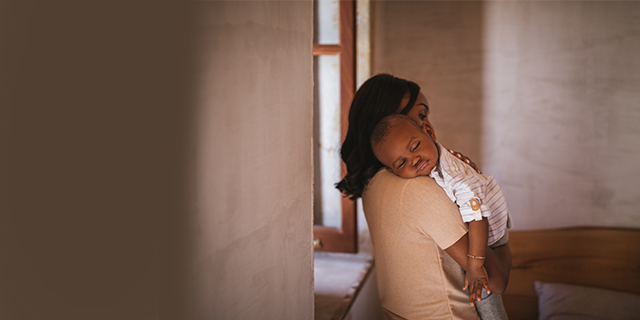The first few weeks of a baby’s life are a time of major adjustment. We focus so much on the inevitable changes for parents that sometimes we forget just how much babies have to adapt as well. It is unfair to expect them to have predictable, regular routines of feeding, sleeping and wakefulness in the early weeks. But, still, we can be very quick to label babies as “good” or “bad”, based on how much they sleep.
A newborn’s sleeping behaviour is not a predictor for how they will continue to sleep throughout their childhood. Recovery from birth, getting used to life outside the womb, feeding, digesting, and even the act of breathing takes a lot of energy.
Although the books and experts give us some idea of how much sleep babies need, these are only guidelines – try not to compare your baby to a non-existent ideal, as it is unrealistic and guaranteed to undermine your confidence. Instead, aim to look at sleep as part of the bigger picture and don’t let it overshadow everything else that is going on in your young baby’s life.
What can I expect and what is normal?
There is no absolute number of hours babies need to sleep according to their age. The best we can do is offer a range of hours, according to age groups. Generally, the younger a baby, the more time they will spend sleeping and, as they get older, they will sleep less.
The following is a rough guide on sleep:
Newborn babies sleep between 15-18 hours/ 24 hours
Babies from 1-4 months, sleep an average of 15-16 hours/ 24 hours
From 4-12 months, they sleep between 14-15 hours/ 24 hours
At 1-3 years, they will sleep roughly 12-14 hours/ 24 hours
By 3-6 years, they will sleep roughly 10-12 hours/ 24 hours.
In the first month of life, most babies are reasonably settled. They wake for feeds and sleep in between. From around 1 month, they tend to be more wakeful, and most babies will have a couple of wakeful, crying episodes a day.
Babies under the age of around 3 months will still wake regularly overnight for feeds. This is because they need a regular intake of milk and can’t digest large volumes at any one time. Breast-fed babies generally need to feed more often than bottle-fed babies.
Small babies don’t know the difference between night and day. It can take 6 or more months for their bodies to learn how to sleep longer overnight and be more awake through the day.
Most parents find that they need to still get up overnight for the first 6 months and feed their baby at least once. This is normal and, with time and gut maturity, your baby will be able to sleep for a longer, more continuous period.
Sleep is an important part of childhood and we still don’t understand a lot of the complex processes that occur during sleep. Babies spend a lot of their sleeping time in Rapid Eye Movement (REM) sleep, which causes them to be noisy and move around. It is normal for babies to be active during their sleep.
How babies form sleeping habits
Some facts:
Falling asleep is, in itself, a natural process. All of us tire out after sufficient wake time and energy expenditure, and the body naturally transitions to a weary state. Sleep is essential to rejuvenate and boost a child’s tolerance for being awake. When babies are asleep, they release growth hormones, conserve energy and consolidate memories, which are vital in terms of their overall development.
Most babies show tired signs that signal they need to sleep. If parents are sensitive to these sleep cues and respond to them early enough, settling can be a much smoother progression.
Overtiredness or missing a baby’s “sleep window” can prolong the settling process and lead to frustration for both the parent and child. Be confident in your ability to know your baby and understand what they are telling you.
Little babies will often fall asleep when they are feeding or being cuddled. Enjoy this special time and try not to worry that you are setting yourself up for difficult days ahead. As your baby gets older, they will understand more, and you will have plenty of time to be more structured about how you choose to settle them.
Regular, predictable, consistent settling routines (with a little flexibility) help habits to form. Humans are creatures of habit and young children need the same patterns of care to boost their sense of security and know they are truly loved.
Some experts believe that sleep behaviour is genetic and parents, who don’t need a lot of sleep, are more likely to have children with the same traits. We can’t do much about our children’s DNA, but we can try to manipulate their environment so it is more conducive to sleep.
Babies tend to sleep better in a darkened room with a cooler temperature. Small amounts of filtered sunlight each day are useful for the brain’s production of melatonin, the sleep hormone. This also helps with the development of a biological rhythm.
Some parents put on the same music (e.g. a lullaby CD), tuck their baby into the cot in a particular way and go through little rituals, which signal it is time for sleep. Some light background noise while your baby is settling will help them to not become too noise sensitive.
Read to your baby every day, no matter how young they are. This is a lovely way to wind down and helps boost literacy development.
How to encourage your baby to form good sleep habits
Understanding the basics:
The first thing to accept is that your baby will have their own ideas on how much sleep they want, though you’ll have your own ideas on how much they need. These two concepts can be at opposite ends of the nursery.
Your job as their parent is to provide a safe, clean, nurturing sleeping environment for your baby, and give them the opportunity to sleep when they need it. Their job is to go to fall asleep without too much fuss and stay asleep for sufficiently long to wake feeling refreshed and energised. You cannot trade these roles, no matter how much you would like to.
Have a safe cot for your baby to sleep in and make sure they go into it for all of their sleep times. Although this sounds simple, some babies do complete circuits of the house and sleep on beds, lounges, prams and anywhere they happen to drop off to sleep.
Follow a regular pre-settling routine with your baby, so they know what’s coming. Baby will learn through repetition – and yes, it sounds boring but it’s very true.
During feed times overnight, try not to give your baby too much stimulation. Keep your care low-key, calm and just enough to address their basic needs, without encouraging them to stay awake. Soft lights, being organised beforehand, and having a light, calm touch will help your baby transition back to sleep more easily.
Day-time sleep is a vital part of infant sleep and babies that sleep well through the day generally sleep better overnight. Good “napping” habits in the day influence night-time sleep.
Avoid over-stimulating your baby and winding them up when it’s time for sleep. A warm bath, pajamas, reading time, and a last feed for the night, are all lovely pre-bed prompts.
Avoid letting your baby sleep through day-time feeds or sleep for too long during the day. Generally, a 3-4 hour sleep (even for a newborn) in the daytime is enough between feeds.
Remember, your baby is not an extension of you, no matter how strongly connected you feel to them. They have their own separate, unique personality and temperament, which strongly influence their sleeping habits. Sometimes your baby will sleep well, and sometimes not. Go with the flow, change what you can, and avoid seeing their sleeping behaviour as something you need to control.




























